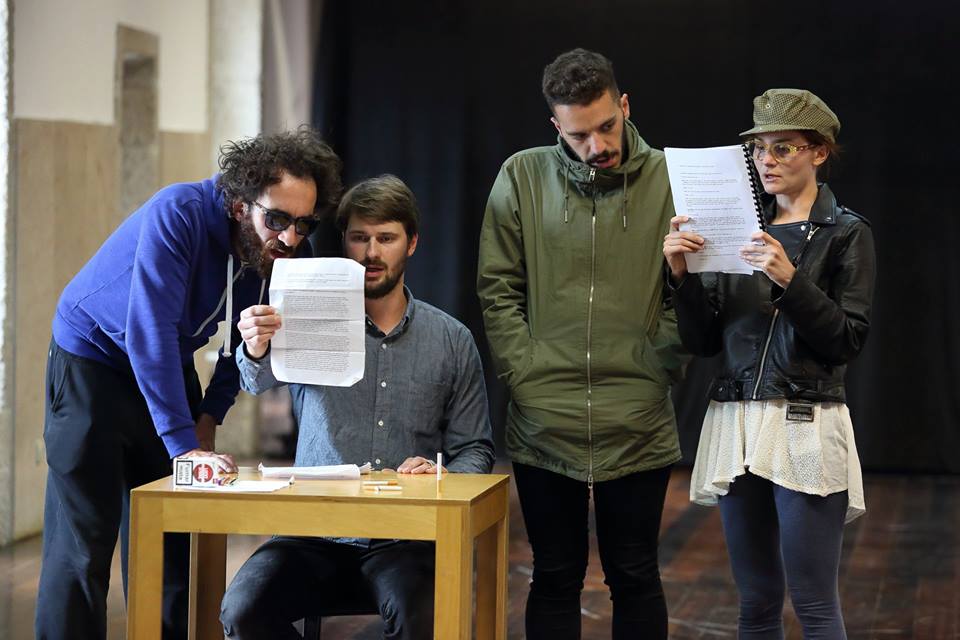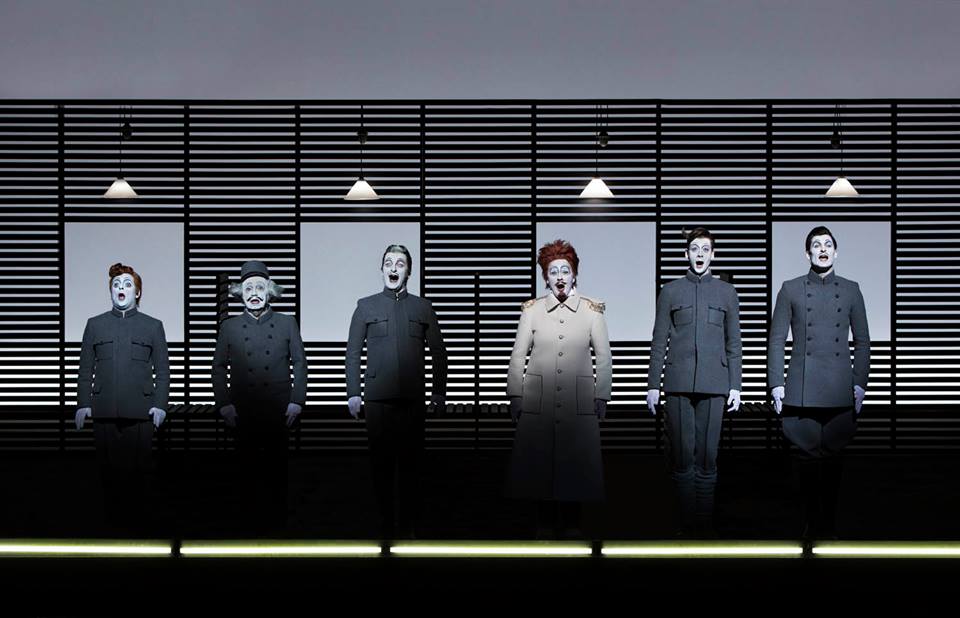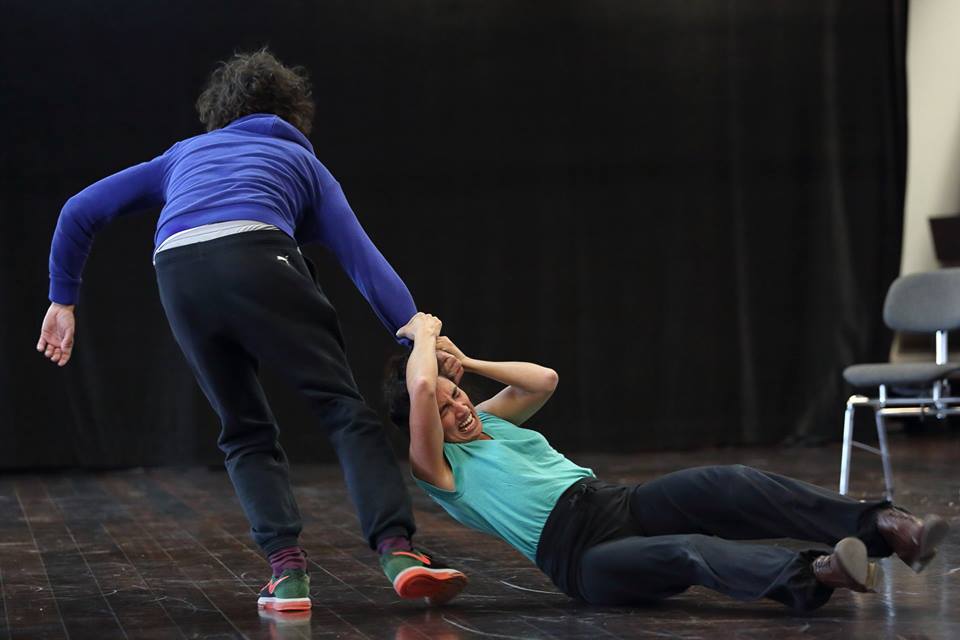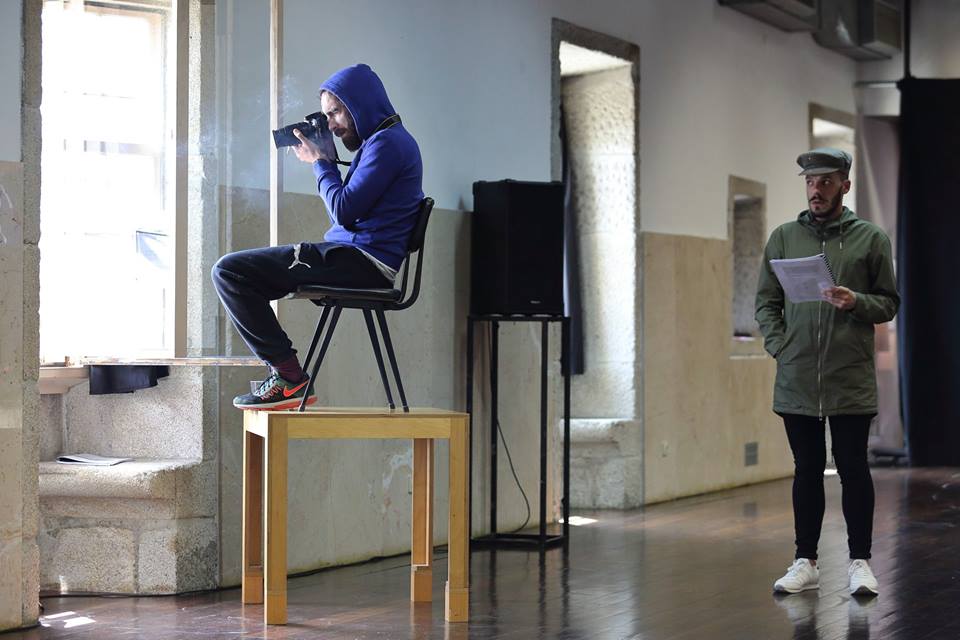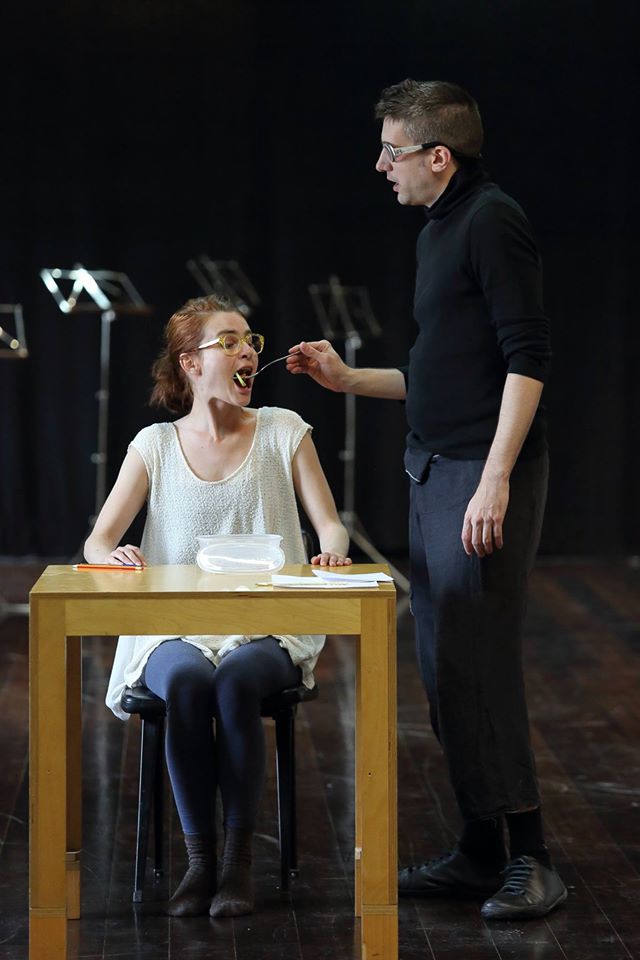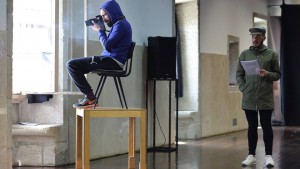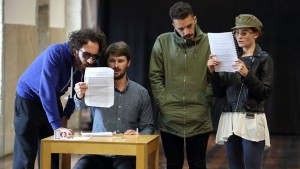Looking for a strange language

“It’s about speaking your own language in a way that other people are inspired to speak their own language. We rely on the difference between languages and the friction of the images that are moved by these languages. An idea is developed through everyone speaking and a mode of conduct that cannot be traced back to a single person. The whole is neither more nor less than the sum of its parts. It’s different, yet the same.” (Dirk Baecker)(1)
We can only find these lights in the darkest depths. They magically attract us; the closer we get to them, the more dangerous and simultaneously fascinating it’ll be — until we, before we believe to grasp it and simultaneously recognize its shape, find ourselves again in a large ghastly mouth. In hindsight, in your own solving, we then come to realize that the light was only a trap, a deception, that we have fallen victim to. Now that we have landed in the stomach of the fish, now that it’s impossible for us to be with the light, we are in it, as it were. It’s this moment that unites the deep sea fish with a theatre of the foreign, where we believe to have realized something only to then become aware of the fact that we can merely look at it but never see through it.
In recent times more and more international theatre groups have emerged, and reflect on their ‘own’ cultural and societal differences, and thus the conditions for their collaboration. It has been noticeable that these groups have very different approaches to their linguistic and cultural differences. As soon as various language and cultural realms meet in theatre, how we deal with the foreign is not only an important indicator — after all it has always been one, even without multilingualism or the like on stage; what’s more, how we deal with the foreign determines the relation to theatre which either serves as a self-affirmation machine, when you want to make the foreign understandable, or else can be seen as a space that allows for boundary experience, when we look to admit the foreign. That raises the question of how we can develop a language through the collaboration of international theatre troupes that grants the foreign to loom large. Not as the part of a foreigner played on a stage or as a key subject of a festival, or even a theoretical panel in the foyer of a theatre that decorates the repertoire; rather in the way of collaboration, and in the way of how we understand and organise our artistic practice, and how we reflect and include the (pre)requisites for our own work.
This question is germane both to national theatres as well as independent theatre companies, and also to independent production groups, that I consider myself to be a part of. It concerns artists of all kind insofar as they don’t rely on sure-fire success mechanisms and want to make art for the sake of art. It particularly applies to internationally active theatre artists as these types of cooperations reveal differences that need to be dealt with, such as linguistic and cultural distinctions as well as those between the various educational (theatre) backgrounds. How can we deal with the non-common, without standardizing it in favour of a common ‘multi-cultural language’, and to have it dissolve in a commensurable international mishmash by making it fully understandable?
I want to plead for the theatre as a space that allows boundary experience; a place where institutions and groups of artists don’t deprive themselves of their ability to surprise themselves. Both through an art scene that tries to calculate the uncertainty of cultural conceptions and positions a bit too much, as well as through an artistic attitude of being all too sure of one’s procedures. I imagine a theatre that may continue to appear foreign to itself.
The theatre of the deep sea fish
Bernhard Waldenfels says in “Thinking the Foreign” that the radical foreignness is only tangible in a paradox way as it escapes our clutches. I cannot see myself where I am not. The radical foreign is walking in front of me, like an invisible ghost, and I still cannot overtake it. It can’t be alienated, but it stays foreign and can only be grasped as an experienced impossibility. At the same time, it has always been part of the own:
“We learn our mother tongue through listening to the language of others that precedes our own speech. The name we are given is the name we got from others; the same goes for our habits, customs and traditions. All ideas of purity are shattered thereon.” (2)
The subject never really owns him or herself; nevertheless he/she is with him/herself abroad as a ‘not-just-me’. They will only find access to themselves through the foreign, which, however, they can never grasp. This dilemma can lead to great frustration as you never find yourself where you want, namely with yourself. On the other hand, it can also lead to a gesture and attitude that opens up to the unknown, which can touch on security, uncertainty and knowledge. The attempt to take over the unknown seems to only succeed through a never-ending approach, and through knowing that it is never quite conceivable. This approach can only occur as long as the supposed obvious knowledge about oneself and others is also perceived as a linguistic, social and cultural construct. Only then can there be a theatrical approach.
What goes for the subject goes for the bourgeois theatre; the subject who ever since Freud can no longer feel at home in his or her own home, as he or she only represents the tip of the iceberg; and deep sea fish lurk in the unconscious who dare to stare at us every once in a while in our dreams with one eye that is similar to our own and one that is profoundly dissimilar and strange. It can no longer consider itself as a bourgeois situation of enlightenment as the status of the supposed tangible knowledge that should be enlightened has become questionable. Especially since the static knowledge has never really been like this in enlightenment; however, at least there used to be certain bourgeois ideals that ought to have been reached for in order to experience freedom as an independent autonomous individual.
The theatre has always been dealing with representations — just like every person that speaks, thinks and therefore abstracts. The scrappiness of these representations, however, can never be completely hidden, no matter how adept the fourth wall. In theatre we pretend as if there were no abyss where said deep sea fish bustle — between every term and every phenomenon that has to be named; between every actor and his or her character; as well as between the aspirations of a theatre and its reality. A great part of contemporary theatre still largely practices a type of theatre whose means are hierarchical and used for the purpose of an idea in order to depict the world in the broadest sense, without questioning the conditions for this logic of depiction. What’s more, a different artistic practice has been established for a long time already where the central means have taken on a life of their own and become autonomous. Brecht had declared war on suggestions, the opium dens for the people, in order to expedite the attempt of an epic theatre. He did so through making the familiar appear unfamiliar again through the means of theatre, so that things that appear recognized could move out of their inconspicuousness and could be looked at in a different way. It must have been about pointing out the phantasmal content of societal mechanisms, but not without applying them themselves. Brecht seemed to know that theatre doesn’t allow the circumvention of the illusion, and that you can only win over it by climbing down into the “opium dens, the hatchery of the illusion (…)” (3). Nothing works without illusion.
Theatre as a machine of surplus
If it’s no longer ostensibly about theatre offering subjects the possibility to make sure of themselves through the identification with illusions, it can suddenly be about something else entirely. The terms ‘post-dramatic theatre’, coined in the 1960s by Hans-Thies Lehmann as a reaction to artistic theatre practices, eliminates the hierarchy in theatre by breaking up its centre of the literary basis and its interpretation by the director and releasing the means of theatre in order to attribute them an autonomy (again). Light, sound, image, costume, voice, video and text are equal means, and are participants of a performance act that is paid more attention to (4). Theatre as a location of tangible assembly steps into the foreground again by no longer reducing the theatre text to the dramatic text; rather the theatre performance itself creates a text through the “shared time spent in the shared air we breathe in the room” (5). This text is able to reflect the foundations of theatre, and addresses the status of its illusory reality. Of course, that doesn’t mean that we shed the illusion, because it will always be there, no matter how cool you are standing on stage. It’s much more about enduring the ambivalence of the theatre, which always refers to something else, as it has always more than one ground there. Everything is at least doubled. Even a fly that crosses the air and light of a performance suddenly becomes a different fly. There are now at least two flies.
Which brings us back to the deep sea fish. Those beings who lurk in the abyss of representation, and who are on the one hand dangerous and eerie, and on the other can be this fascinating and intriguing precisely because of that; because these mechanisms of representation are displayed in the very moment when the performance itself is addressed. The fly can no longer count as a representation of an ordinary fly, but becomes something else. Yanking up the representation exposes a space that is not yet occupied and doesn’t have a solid form but that means opportunity. And since we can only describe this space through a symbolic, phantasmal which can never only name what we want to name, we have to send eerie deep sea fish into the abyss as a metaphor. They lurk everywhere: between the name and the person who is meant by that name; between the term ‘tree’ and the thing that we point to when it has a trunk, twigs and a few leaves; in our dreams and finally in itself as a metaphor. What do these deep sea fish have to do with the foreign now?
“The foreign can only be conceived indirectly; as a deviation from the normal and as a surplus which exceeds the normal expectations and demands. Talent, gift and forgiveness are some examples; excesses of hatred and violence as well as agony and traumatisation are also part of it. We encounter them on the verge of the ordinary and the extra-ordinary. Without the effect of trans-cultural surpluses, every culture ends in culturalism which revives the old aporias.” (6)
Theatre which continuously refers to itself is as interesting as a conversation in which the conversation partner has to point out that you’re having a conversation, thus blocking the actual conversation. Displaying for the sake of displaying doesn’t seem to be a good concern for interesting theatre. Nevertheless, reflecting on the act of performance is liberating because it can open the space for potentiality as you can strive to think and perceive the conditions of your own thinking and perception. You may think that you cannot completely think everything, and you may perceive that you cannot perceive something as a whole. Room for imagination yawns that allows for something foreign to appear. The foreign is precisely what I cannot denote with the deep sea fish as a term, but what I need to and have to denote. The deep sea fish thus permanently change their form as they repeatedly challenge other descriptions and other terms; they are truly there — behind the light that they carry in front of them like a fishing rod — where you cannot see them until they cease to be deep sea fish, but have always been something else. In a linguistic approach to phenomena of this world we continuously produce surpluses. These are words, images or signs in general that overstate what they want to denote, as they cannot hit it, and they cannot be realised in what they want to hit. The foreign may seem indirect in the light of this surplus; namely as a rest that cannot be realised in the understanding of this thing or this phenomenon, which was to be denoted or ascertained. Theatre permanently deals with signs and images and in doing so produces a surplus, because everything appears doubly and nothing can only mean that one thing. The theatre is a surplus machine. The surpluses, however, are only visible once they are perceived in the act of overshooting.
An artistic practice that manages to get on to this foreign or, to stay with the metaphor, these deep sea fish, and to discover it in the surplus, that don’t defer to a complete understanding of things, meets a changed understanding of subject. This is because it finds less of the ‘I’ of oneself rather than the subject of the unconscious, as Hans-Thies Lehmann comments in the post-dramatic theatre. You need an appropriate location in order to suffer the ambivalence of the subject; to rejoice in it; to play with it; and to experiment with its possibilities and dangers. And the theatre can be this location. Not the cinema, or painting; not the fine arts — the moment of the here and now of a real gathering of all actors is missing here. No, the theatre is the only vehicle, as Samuel Weber describes it, that can be ‘on location’.
This theatre on location doesn’t draw its power from a message that it wants to convey, or from one meaning that it wants to establish; rather it is more open towards the effects it produces as it pays more attention to the moment in the here and now. It sees itself more like an experiment with an open outcome, and tests phenomena rather than merely puts them on stage. The focus does not lie in the depiction of the world rather than in the implementation of the world. However, in this implementation we may and must work with depictions, as the illusory imaginations are indispensable to even imagine anything. It’s less about the understanding of something than about the (alien) experience.
This experience of the foreign is also due to the kind of artistic collaboration. In parallel to the emergence of the term “post-dramatic theatre”, moving the method of working away from the director to collectives and director duos has become more established, especially in the German independent theatre scene, such as done in, for example, the Rimini Protokoll, She She Pop, Gintersdorfer Klaaßen, Auftrag und Lorey, Hoffmann und Lindholm or Monster Truck, and many more. These methods put a plurality of voices in the foreground that allow for an outside perspective instead of following the one genius interpretation of a single director. Heiner Goebbels writes, “Not seeing one’s own lack of competence as a weakness and covering it up but using it as a strength in order to broaden the artistic perspective and to thus broaden the view of the other — this is the core of the collective work.” There therefore is room for the possibility of opening up to something foreign not only in terms of form and aesthetics and its effects on an audience, but also as space can open up in the method itself.
The international theatre collective ISO or (un)learning how to speak collectively
Such artistic collaboration — the kind of collaboration as such, that is — strives to approach foreign or strange space. ISO (International Super Objective Theatre) (7) , which is still evolving, can demonstrate how these spaces can be felt out in the context of artistic, international collaboration. This collective was born out of various masterclasses, organised by the Union des Théâtres de l’Europe (UTE), an association that chiefly unites big national and municipal theatres from European countries. It’s all the more amazing that experiments are being embarked upon here as well through attempting the collective work between members of various language and cultural realms, facilitating space for something new and unknown, also in terms of finances.
The group largely consists of actors and only to a small extend of directors. Some of them work in the independent scene, while others are employed. Everyone has a different educational (theatre) background, speaks a different mother tongue, and lives in different theatrical contexts. It took a while until I could see the fact that we hadn’t found each other ‘organically’ as an advantage. Now I see this fact as an advantage because you collaborate with people who, normally, you would otherwise never work with. On the one hand, that’s because you dally over different aesthetics and are used to different production processes; on the other hand it’s because you tend to move within your national borders when it comes to work. This foreignness amongst each other has led to long discussions on working methods, aesthetics and terms in the course of the residences and masterclasses, which we still have today. It challenges your own understanding of theatre and art, and repeatedly leads to questioning your own ideas. ISO is a theatre thinking space, and a source of friction where we continuously renegotiate what theatre can be. The members’ different educational backgrounds (8) lead to the fact that various working methods come together. One person is used to starting with the text, while the other is used to developing the text in the course of rehearsals; yet another is used to putting the actor at the centre of the work, while another focuses on the image, and the third starts with the situation. This shows: ISO doesn’t want to present homogenous aesthetics; it is an aesthetic experiment. The various working methods aren’t suspended in favour of one working method, but are tested one next to the other, which oftentimes leads to lines between, for example, performance and representative approaches being blurred and starting an open exchange between each other. During an open rehearsal at the Sfumato Theatre, where ISO chose Manet’s painting “Le Déjeuner sur l’herbe” as the starting point of their work, the performance approach was at the foreground, as we played a game of imagination next to a comedic role play that mocked its own ‘role-ness’, next to a psychologically motivated play. The performance was put in the context of an open rehearsal; types of theatre are rehearsed here as well. ISO’s joint understanding of theatre is not founded in a joint interest of one aesthetic; on the contrary, it’s founded in jointly working on what initially doesn’t unite us, on what’s between us. The factor that unites ISO is the common interest in the diversity, and the desire neither to dissolve these differences nor to insist on them. This is why it’s important for ISO that we don’t always get along on stage, as different languages are spoken; French is next to Portuguese and next to German, next to Arabic, next to Greek, next to Bulgarian, next to Romanian. The working language is English, but the various languages play an important role both in the artistic form as well as in the working process. ISO therefore often discusses terms, such as form, role, character and phenomenon. The word ‘form’ for the other can mean форма, forme or formă. Thus, through not understanding, we repeatedly are made aware of the construction of our own language. The word that makes you think will hit exactly what you mean may be a different one. You want to talk about one thing but can only talk about many things. Thus, ISO can never only mean one thing; it always means a contradiction and examination of the not understandable.
ISO’s vision lies in finding a common theatre language. You could also call it a European theatre language since the members, with one exception, are all from Europe. The common theatre language doesn’t mean a negation of all (theatre) languages in favour of one understandable and closed one where all others could be realised. On the contrary: for ISO the opportunity of a joint European theatre language can only exist through ambiguity and the impossibility of translating it. Contrary to a policy of borders and clear differentiations, ISO seeks the dissolution of boundaries — the dissolution of various forms of theatre, languages and identities. They bank on a collective working method rather than the takeover of one person, and multilingualism. The attempt lies in trying to jointly learn how to speak. It seems, though, as if you could only learn how to speak this language by simultaneously unlearning it. You can learn that your own language is a foreign language, not by forgetting it but by becoming aware of its own foreignness; much like staring at your own hand long enough to get this fascinating eerie feeling that it might not be your own at all. It’s less about coming up with a new language than about designing the path to this joint speaking in a way that everyone can speak their own language while perceiving it as a foreign language. On stage this path can for instance lie in using language not only as a means for understanding through which we can explain things. Instead it can lie in making language appear as something foreign by putting the focus on its melody, its rhythm and its tonality, as for example done in ISO’s most recent open rehearsal at the Teatro Nacional São João do Porto where we approached Karl Kraus’ text “The Last Days of Mankind” precisely through the various languages.
Probably the most important aspect of ISO’s theatre work therefore seems to be founded in allowing space for the foreign, the unknown. Characteristically, the collective will deal with Ovid’s Metamorphosis in its upcoming project. For ISO, metamorphosis can be the result of transcultural collaboration which is dependent on a certain openness for the new and unknown. Once on the level of collaboration by allowing the co-existence of various working methods, thus allowing for another, a third working method through this juxtaposition. And also on the level of aesthetics which relies on not dissolving the not understandable, especially with respect to language, and instead maintaining and playing with it.
It seems as if this was a climate where deep sea fish feel comfortable and where they would dare to show themselves in the cracks and abysses. They are rarely marvelled at; we can only see their light flash for brief moments. We don’t want to create a theatre that you watch and then say, “That’s it. That’s the foreign!” We can only keep the promise, or as Lehmann put it in relation to Adorno who, when it came to the arts, considered what was opened up to be more relevant than what was achieved: “Great theatre delights more as a promise rather than the upholding of the same. Aesthetic experience notices the flashing of something else in what is happening, a possibility that is pending and in a utopian way upholds the condition of something announced that is undefined.”
[1] Dirk Baecker: “Das Theater als Trope“. In: “Theater der Zeit“ – Arbeitsbuch 2011, No. 7/8, p. 15.
[2] Bernhard Waldenfels, Das Fremde denken, in: Zeithistorische Forschungen/Studies in Contemporary History, Online-Ausgabe, 4 (2007), H. 3, URL: https://www.zeithistorische-forschungen.de/3-2007/id=4743, (20 December 2016)
[3] Frank-M. Raddatz: “Das Theater der Täter”, in: same pbl.: “Brecht frisst Brecht”, 2007, Henschel Verlag, p. 17 ff.
[4] Cf.: Samuel Weber: “Vor Ort”, in: G. Brandstetter, Helga Finter, Markus Wessendorf (pbl.): “Grenzgänge: Das Theater und die anderen Künste”, Thübingen, Gunter Narr Verlag, 1998, p.31 ff.
The predecessors of the bourgeois dramatic theatre had not yet banned this moment of the performance, as Samuel Weber explains with view to the Aristotelian term of the unit of time and location, which, according to Weber, was first in relation to the dimension of the performance, not the plot.
[5] Thies Lehman, Hans: “Postdramatisches Theater”. Frankfurt am Main, 1999, Verlag der Autoren, p.12
[6] Bernhard Waldenfeld, Das Fremde denken, in: “Zeithistorische Forschungen / Studies in Contemporary History”, online edition, 4 (2007), H. 3, URL: https://www.zeithistorische-forschungen.de/3-2007/id=4743; (20 December 2016)
[7] The collective came together under the guidance of the Union des Théâtres de l’Europe (UTE) and has been supported by funds from the European Union. Currently the collective is composed of: Petya Alabozova, Balazs Bodolai, Bilyana Georgieva, Khawla Ibraheem, Aglaia Katsiki, Boris Krastev, Benjamin Lew-Klon, Sophie Lewisch, Vincent Mejou-Cortes, Luis Puto, Angélique Zaini, Kim Willems.
[8] The various educational institutions are: ESAD (École Supérieure d’Art Dramatique de la Ville de Paris); Szentgyörgyi István Faculty of Theatre Arts at Târgu-Mureş in Hungary; National Academy for Thatre and Film Art “Krastyu Sarafov”; Acting and theatre studies rom the University of Haifa; National Theatre of Northern Greece Drama School; media and cultural studies at the Heinrich Heine University in Düsseldorf; theatre direction at the Academy of Performing Arts Baden-Württemberg in Ludwigsburg; CEPIT (Regional Conservatory for Drama); Conservatoire National Supérieur d’Art Dramatique in Paris; Escola Superior de Música, Arte e Espetáculo do Porto; Institute for applied theatre science in Gießen.
Published on 22 February 2017 (Article originally written in German)
